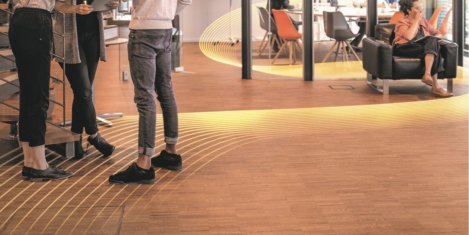To provide the best experiences, we use technologies like cookies to store and/or access device information. Consenting to these technologies will allow us to process data such as browsing behaviour or unique IDs on this site. Not consenting or withdrawing consent, may adversely affect certain features and functions.
The technical storage or access is strictly necessary for the legitimate purpose of enabling the use of a specific service explicitly requested by the subscriber or user, or for the sole purpose of carrying out the transmission of a communication over an electronic communications network.
The technical storage or access is necessary for the legitimate purpose of storing preferences that are not requested by the subscriber or user.
The technical storage or access that is used exclusively for statistical purposes.
The technical storage or access that is used exclusively for anonymous statistical purposes. Without a subpoena, voluntary compliance on the part of your Internet Service Provider, or additional records from a third party, information stored or retrieved for this purpose alone cannot usually be used to identify you.
The technical storage or access is required to create user profiles to send advertising, or to track the user on a website or across several websites for similar marketing purposes.
 Siemens Smart Infrastructure has launched a smart building suite designed to create more efficient and flexible workplaces where people are at the core. The suite of IoT (Internet of Things) enabled devices, applications and services turn offices into a competitive advantage for companies. More →
Siemens Smart Infrastructure has launched a smart building suite designed to create more efficient and flexible workplaces where people are at the core. The suite of IoT (Internet of Things) enabled devices, applications and services turn offices into a competitive advantage for companies. More →








 UK employers claimed £35 billion of free labour last year because of workers doing unpaid overtime, according to an analysis of official statistics published today by the
UK employers claimed £35 billion of free labour last year because of workers doing unpaid overtime, according to an analysis of official statistics published today by the 
 Two thirds of UK business leaders expect developments in technology to lead to an increase in the number of permanent jobs created this year, a survey has suggested. The South West and Wales region is the most confident about the impact of new technology, with nearly three quarters of businesses anticipating jobs growth, compared to 56 percent in the least optimistic region, the North of England.
Two thirds of UK business leaders expect developments in technology to lead to an increase in the number of permanent jobs created this year, a survey has suggested. The South West and Wales region is the most confident about the impact of new technology, with nearly three quarters of businesses anticipating jobs growth, compared to 56 percent in the least optimistic region, the North of England. 
 Nine in ten freelancers in the UK feel the move to freelancing has improved their quality of life, a
Nine in ten freelancers in the UK feel the move to freelancing has improved their quality of life, a
 Each flexible coworking space created in a smaller town or suburban area reduces carbon emissions by an average of 118 tonnes a year thanks to shorter commutes, an international
Each flexible coworking space created in a smaller town or suburban area reduces carbon emissions by an average of 118 tonnes a year thanks to shorter commutes, an international 
 Slow progress is being made towards more women on boards across Europe and less gender pay disparity, a study has suggested. According to
Slow progress is being made towards more women on boards across Europe and less gender pay disparity, a study has suggested. According to 
 Employers should prepare themselves for a dramatic rise in staff taking shared parental leave, a new
Employers should prepare themselves for a dramatic rise in staff taking shared parental leave, a new 


 Over the last 12 months, seven in 10 UK business leaders witnessed presenteeism, where someone come into the office when they are unwell, a survey has claimed. The issue is particularly prevalent at certain times of the year, recruitment firm
Over the last 12 months, seven in 10 UK business leaders witnessed presenteeism, where someone come into the office when they are unwell, a survey has claimed. The issue is particularly prevalent at certain times of the year, recruitment firm 











February 19, 2020
Look beyond the perks and reviews to get a clear view of an employer
by Delaney Kline • Comment